The common man’s woes or the film industry's hypocrisy Saadat Hasan Manto said it like it is and theatrewallahs today continue to stage his powerful short stories

Saadat Hasan Manto, short stories, theatre, theatrewallahs, Mumbai Guide, Toba Tek Singh, Mohit Sharma, Motley, Ismat Manto Hazir Hai, Jashn-E-Qalam, Nandita Das, Mammad Bhai, Bhendi Bazaar Urdu Festival, Prithvi Theatre
On the eve of India’s 66th Republic Day, theatre person Mohit Sharma performed Saadat Hasan Manto’s acclaimed short story Toba Tek Singh that earned him a standing ovation at The Hive, in Bandra. The story is set about two or three years after Independence in 1947, when the Governments of India and Pakistan decided to exchange Muslim, Sikh and Hindu prisoners, and revolves around Bishan Singh, a Sikh inmate of an asylum in Lahore, who is from the town of Toba Tek Singh.
The most powerful scene in the play is of Bishan lying down between barbed wire fences: “There, behind barbed wire, was Hindustan. Here, behind the same kind of barbed wire, was Pakistan. In between, on that piece of ground that had no name, lay Toba Tek Singh,” writes Manto.
ADVERTISEMENT
Class act
“As a nation, we have woken up to Manto’s writings in the last decade — when his works have been widely performed in Indian theatre. His writings were way ahead of their time and remain significant today, because the issues he talks about in his plays continue to exist,” says director and actor Mohit Sharma.
Manto is best known for his stories about the partition of the subcontinent immediately after Independence. Although he wrote essays, screenplays and one novel, Manto’s métier was the short story. He published over 20 collections, 600 short stories, more than 100 radio plays and essays and several sketches of people that crossed his path. Moving from North India, he came to Bombay to sell his talents to the movie industry, and died at 42 in Lahore, after a long struggle with alcohol post the Partition.
The Motley Theatre Group, which was started by Naseeruddin Shah and Benjamin Gilani in 1979, has performed Manto’s stories extensively. “The origins of theatre lie in story-telling, anyway, so it isn’t difficult to see why his stories work so wonderfully in theatre — the construction of the story, the unfolding of the drama, the power of the descriptions, all lend themselves beautifully to being spoken. Strangely, the few plays he wrote (radio plays) are not in the same league as his prose writing,” shares actor/director Naseeruddin Shah.
His wife, fellow theatre person Ratna Pathak Shah, however, believes that not all his stories are suitable for performance, but some like Titwal Ka Kutta or Kali Shalwar, work well as they are able to capture human relationships in moments of great trauma in the most economical way. “With a few words he can paint the picture of Partition, like he does in Siyaah Haashiye. I don’t know many others who can do that,” she explains.
Naseeruddin Shah first heard of Manto mentioned as a writer of smut. He encountered his work much later through Siyah Haashiye, which he considers the absolute apotheosis of short story writing. Pathak Shah remembers her first brush with manto’s writings, “I had heard the story of Khol Do from a friend when I was about 16. The horrors of the Bangladesh war were still fresh in my mind and the way rape had been used as a weapon of subjugation in that conflict (and many others before and after) shook me up even in that sketchy telling. But when I read it myself some years later, the story shattered me with the raw power of his storyteller’s craft.”

A scene from Mohit Sharma’s adaptation of Saadat Hasan Manto’s short story Toba Tek Singh
Mumbai based theatre group, Jashn-E-Qalam does dramatic readings of some of Manto’s work. Group member KC Shankar echoes Pathak Shah’s thoughts, “He had the gift of seeing people for what they were. His stories treated the pimp and prostitute alike and sometimes as more human because they survive in spite of all that they endure. That compassion leads to drama. He made the audience a part of the plot, made you laugh and then reminded you that don’t laugh, that character is you. The end of each of his stories is a sledge hammer.”
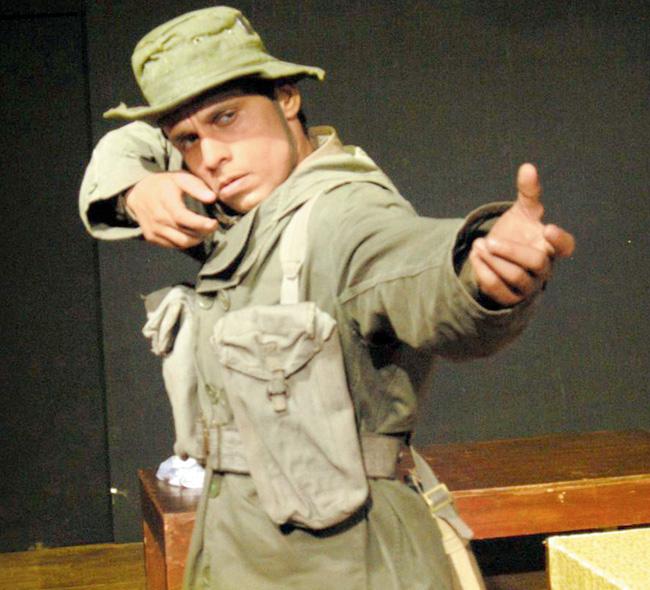
A scene from Motley's Ismat Manto Haazir Hai
“He goes where I don’t want to; he tells me about people that I pretend don’t exist; he pulls me into situations that I pray I never have to witness in life, and in doing so, he acts as the conscience of our society — it’s not a comfortable position to take and he suffered because he saw clearly and spoke so fearlessly. No other writer of his generation lived on the edge as he did and paid the kind of price he did,” reminds Pathak Shah.
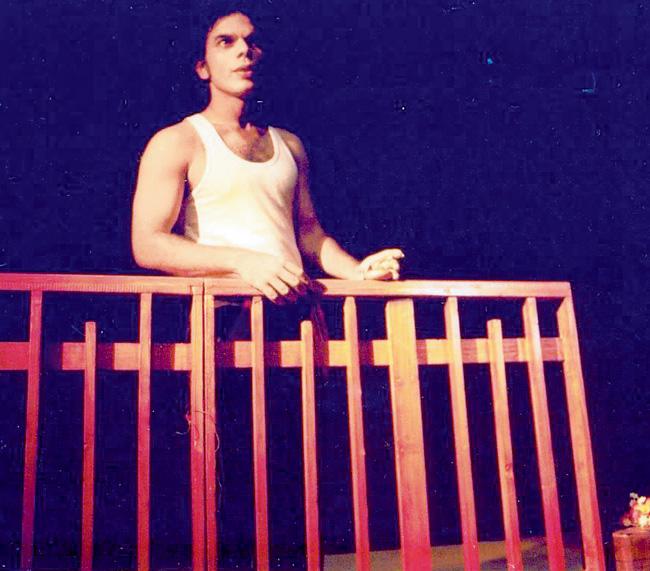
Motley’s Ismat Manto Haazir Hai at Prithvi
“Manto’s writings have the necessary conflict, a human touch and shades of grey required for a good play,” feels Iqbal Niyazi of Kirdaar Art Academy, which has staged Manto’s lesser-known works like Teen Khamosh Auratein, and Jeb Katra. The academy plans to hold a Manto festival in April where groups from Bhopal, Kashmir and other cities will perform.
Controversy and Manto
In 2014, Mumbai’s first Bhendi Bazaar Urdu festival showcased Manto’s play Mammad Bhai. “We couldn’t have chosen a more apt play. Mammad Bhai was an actual character from Bhendi Bazaar, in those days. He was a goon on the outside but actually shy and cowardly on the inside. The character is representative of the sensibilities and aura of the area and the characters are three-dimensional, typical of Manto’s work,” reveals Zubair Azmi, director of the Bhendi Bazaar Urdu Theatre Festival.
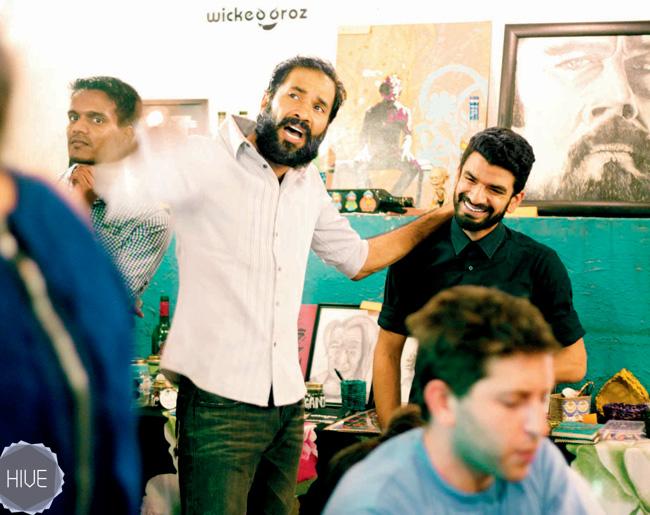
Jashn-E-Qalam does dramatic readings Pic courtesy Labony Kaushal/ The Hive
“The prescience of Manto’s vision troubled those who considered any criticism of Partition to be blasphemy, and the fact that he didn’t shy away from dealing directly with sexual issues, and didn’t pull his punches when it came to satirising our hypocrisies, made him an easy target,” Shah points out. “We have had irate members of the audience saying that Bu was obscene when we did it in Mumbai in 2004. I can only imagine what a furor he must have caused when he wrote of prostitutes and pimps, rapists and madmen, exploiters and the exploited, in the most compassionate way possible. It is a feat which few writers have accomplished anywhere in the world,” shares Pathak Shah.
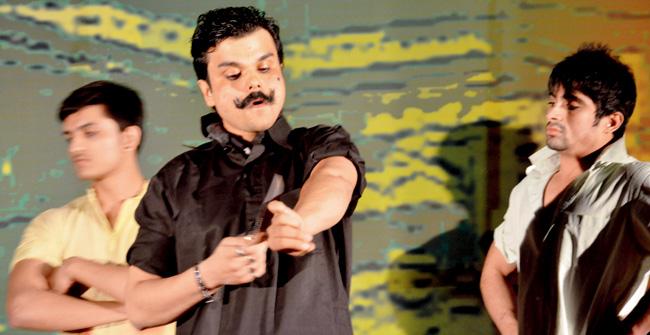
Mammad Bhai performed at the Bhendi Bazaar Urdu festival
Actor-director Nandita Das, who is directing a film on Manto’s life, says, “He remained defiant after being tried for obscenity. If you cannot bear my stories, then this is an unbearable time, he said. He neither judged nor pitied his characters, but simply wrote with unadorned honesty about the world he shared with them. ‘I am no sensationalist,’ he wrote.”
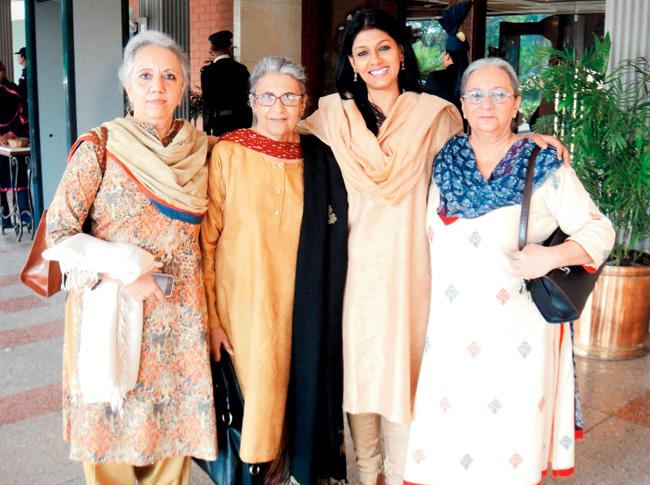
Nandita Das with Manto’s daughters
“There was nothing subtle about Manto’s subjects. He was a dramatic writer, and the issues he addressed in his writings, like hypocrisy in the film industry, suppression of sexuality, and religious fundamentalism, still remain, and that makes his works relevant even today,” believes Urdu theatre veteran Tom Alter, who performed a dramatic reading, titled Manto aur Ghalib: Ek Guftagu from Rabishankar Bal’s Dozakhnama. The story is a conversation between Mirza Ghalib and Sadaat Hasan Manto in their graves.
Filmmaker Kabir Chowdhary, who directed a short film based on Manto’s stories, sums it up nicely, “Manto’s stories make for great adaptations for theatre and cinema because they deal with the fringe elements of society, and characters that every artiste would find intriguing.”
NOTE: Mumbai has been referred to as Bombay to maintain continuity of the time when Manto lived in the city.
 Subscribe today by clicking the link and stay updated with the latest news!" Click here!
Subscribe today by clicking the link and stay updated with the latest news!" Click here!







